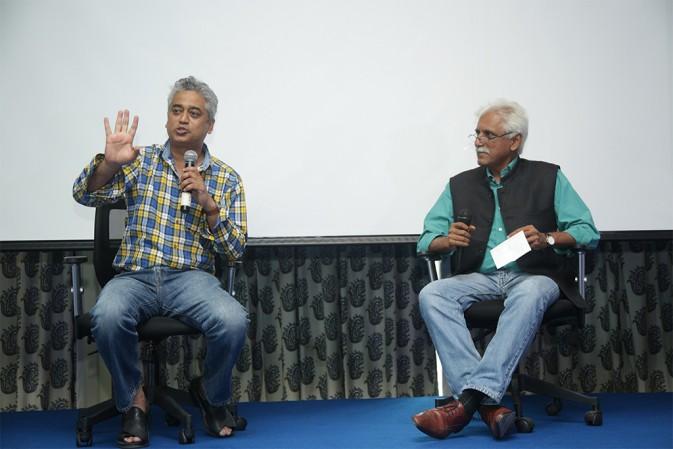
The Indian media is often targeted for hiding the truth, low reporting standards and protecting the government over critical issues that require attention. However, there is a darker side of the coin that highlights how journalists, writers and academics are being silenced by those in power.
The Press Council of India's report on "Safety of Journalists" observed that at least 80 journalists have been killed since 1990 in India.
An organisation named 'Reporters Without Borders' claimed that the vulnerable position of media has increased under the regime of BJP and Prime Minister Narendra Modi. While measuring India on press freedom scale, the prestigious organisation ranked the country at 133 out of a total of 180 countries. "PM Modi seems indifferent to these threats and problems, and there is no mechanism for protecting journalists," the report stated. "Instead, in a desire to increase control of media coverage, Modi envisages opening a journalism university run by former propaganda ministry officials," it added.
As per senior journalist Shekhar Gupta, "A war on the news media causes any government terrible, often terminal damage. It does no real harm to the media."
Reporting on Yakub Menon: There was huge outcry among people after the centre accused three TV news networks of violating norms of broadcasting by airing interviews that criticised the execution of Yakub Memon. Notably, Yakub was convicted of financing the deadly 1993 bombing attacks in Mumbai. The government even cautioned the channels about cancelling of their licence for violating broadcasting laws. While clearing its stand, the government observed that the broadcast interviews by these channels contained controversial content, which "cast aspersions against the integrity of the president and judiciary".
According to media reports, his execution raised debates on the death penalty and "selective justice" in the country and questioned the government authorities for betraying Menon even after surrendering.
One day ban on NDTV: In 2016, the I&B ministry ordered one day ban on the Hindi news channel NDTV India for its coverage militant attack on the Pathankot airbase. Such an incident occurred for the first time in Indian history where the centre directed a TV news channel to be blacked out for allegedly showing "strategically sensitive information" during a terror attack alleging that the broadcast of the programme harmed the security of the nation. However, the unilateral decision showed that the government is trying to convey that when it comes to media, it resists the power of execution.
Action against Outlook magazine: In July 2016, members of India's governing Bharatiya Janata Party (BJP) registered a criminal complaint against the Outlook magazine and reporter Neha Dixit for publishing a report exposing how 31 young girls were trafficked by an influential Hindu organisation in order to "Hinduise" them. The case was filed against the reporter for promoting "disharmony or feelings of enmity" between different ethnic and religious groups.
The resignation of eminent journalists: Journalist Punya Prasun Bajpai, who was running the show 'Masterstroke' on ABP as an anchor, left ABP as he was asked by the management to avoid the name of Prime Minister Narendra Modi and to avoid content that criticises the government policies on his programme. In addition, ABP News managing editor Milind Khandekar had also stepped down before Bajpai as employees were asked to either "tailor" or "tone down" their content. Thus, they were left with no other choice but to resign.
Taking a note of the situation, the Editors Guild of India recently condemned the manner in which the right to practise independent journalism is seen to be threatened by a combination of forces.
No respect for journalists: Eminent journalists Shujaat Bukhari and Gauri Lankesh were shot dead by assailants on motorcycles, indicating how easy it is to silence dissenting intellectuals and rationalists. Undoubtedly, their voices were so loud that they poked the silent top leaders in power. As people were criticising PM Modi for not uttering a word on the issue, Sri Ram Sene Chief Pramod Muthalik defended the Prime Minister by saying " Why should the PM react every time a dog dies in Karnataka?"
Interestingly, during the function of Ramnath Goenka Award in 2016, Modi criticised late PM Indira Gandhi for implementing emergency rule in 1975. He said, "Every generation must keep reflecting on the emergency period in an unbiased manner so that no future political leader can even wish to commit the same paap." However, it seems that the statement doesn't validate the current position of media as every one desires to wash their hands with PM Modi's so called "paap".









!['Had denied Housefull franchise as they wanted me to wear a bikini': Tia Bajpai on turning down bold scripts [Exclusive]](https://data1.ibtimes.co.in/en/full/806605/had-denied-housefull-franchise-they-wanted-me-wear-bikini-tia-bajpai-turning-down-bold.png?w=220&h=138)



